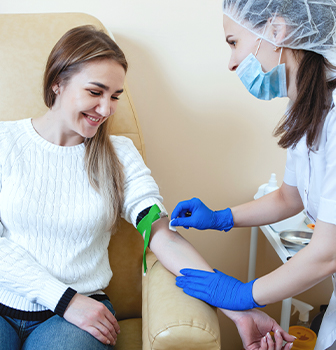
8 Key Egg Donation Disqualifications You Need to Know
Why Are Egg Donation Criteria So Strict?
Egg donation is an incredible opportunity to help someone build their family, but it’s also a process that comes with careful consideration. Fertility clinics and agencies take several steps to ensure everything runs smoothly—for both donors and recipients. They evaluate donors to:
- Keep donors safe: Your health and well-being are top priorities.
- Support successful outcomes: Healthy, high-quality eggs increase the chances of success for recipient parents.
- Maintain high standards: Ethical practices ensure fairness and transparency for everyone involved.
Understanding what’s required to qualify can help you decide if egg donation is the right path for you. It’s a meaningful journey, but it’s important to know what to expect before taking the first step.
General Requirements for Egg Donors
Before exploring disqualifications, it’s helpful to know the baseline requirements for becoming an egg donor. Most programs look for candidates who:
- Are between the ages of 21 and 31.
- Have a healthy BMI within the range of 18–29.
- Are non-smokers and free of drug or nicotine use.
- Have no significant genetic disorders in their family history.
- Maintain good mental and physical health.
- Experience regular menstrual cycles without reproductive issues.
- Can reliably commit to the medical and time demands of the donation process.
Now, let’s dive into the specific factors that might disqualify someone from donating eggs.
1. BMI Outside the Acceptable Range
One of the most common reasons for disqualification is having a BMI (Body Mass Index) outside the recommended range of 18–29. This isn’t about appearances—it’s about how weight can influence hormone levels, egg quality, and how your body responds to fertility medications. Additionally, a higher BMI can increase risks during the egg retrieval procedure, so clinics set this guideline to prioritize safety.
What can you do if this applies to you?
If your BMI is outside the range, it doesn’t mean you’re permanently disqualified. Here are some steps to consider:
Focus on creating healthy habits, like balanced eating and regular exercise.
Talk to a healthcare provider to develop a sustainable plan for managing your weight.


2. Family Genetic History
When you apply to be an egg donor, one of the first things clinics check is your family’s medical history. Why? Because they’re looking for any hereditary conditions—like cystic fibrosis, Huntington’s disease, or patterns of certain cancers—that could impact the health of the child born from your donated eggs.
Why this matters:
It’s not just about the donation process; it’s about giving recipient parents peace of mind about their child’s long-term health. If your family history raises potential concerns, clinics may decide you’re not the right fit to donate, but it’s all part of ensuring the best possible outcomes for everyone involved.
3. Reproductive Health Issues
Certain reproductive health conditions can disqualify potential donors, including:
- Polycystic ovary syndrome (PCOS): Can affect egg quality and donor health.
- Endometriosis: May compromise fertility or egg viability.
- Irregular menstrual cycles: Suggest potential hormonal imbalances.
- A history of significant miscarriages or reproductive surgeries.
These conditions are evaluated on a case-by-case basis, but they often pose challenges to successful egg donation.
4. Substance-Free Lifestyle Requirements
Donors must lead a substance-free lifestyle to protect their health and ensure the best possible outcomes for the donation process. Smoking, nicotine use (including vaping), recreational drug use, and excessive alcohol consumption can disqualify a candidate. Many programs require donors to have been nicotine-free for at least 12 months before beginning the process.
Why it matters:
- Egg quality: Smoking and substance use can harm egg health, making them less viable for donation.
- Medication compatibility: Fertility treatments rely on a delicate hormonal balance, which substances like nicotine or alcohol can disrupt.
- Health and safety: Substance use increases risks during the egg retrieval procedure and may affect recovery.
- Reciepient parents’ trust: Donors play a crucial role in helping others start a family, and adhering to a substance-free lifestyle ensures the healthiest possible outcome.
What to expect:
Clinics typically conduct screenings for substance use at specific points during the process to confirm adherence to health standards.
5. Mental Health Considerations
As part of the screening process, donors must complete a psychological evaluation. This step ensures that they are emotionally prepared for the egg donation journey and fully understand the responsibilities involved.
What the evaluation looks for:
- A stable mental health history, with no major untreated conditions like schizophrenia or bipolar disorder.
- Effective management of any past or current mental health challenges, such as depression or anxiety.
- The ability to handle the emotional and ethical aspects of egg donation.
This evaluation isn’t about judgment but rather about ensuring donors feel confident, supported, and ready for the process. By addressing these factors upfront, programs aim to create a positive experience for both donors and recipient parents.
6. Geographic and Logistical Barriers
While donors don’t need to live near the recipient parents’ fertility clinic, they must be willing and able to travel if needed. The egg donation process requires significant flexibility and availability to attend multiple appointments leading up to the egg retrieval procedure.
What’s involved:
- Travel to the clinic: Donors may need to fly or drive to the reciepient parents’ chosen clinic.
- Frequent monitoring: Daily or near-daily appointments may be required during certain stages of the process, particularly closer to retrieval.
- Commitment to schedule: Appointments for hormonal injections, monitoring, and medical evaluations must be prioritized.
- Reliable transportation: Whether traveling locally or long-distance, donors must have access to reliable transportation.
What’s required to succeed:
A clear understanding of the time and effort involved, including coordinating with the donation program for travel logistics..
A flexible schedule to accommodate frequent and sometimes last-minute appointments.
Availability for travel and the ability to take time away from personal responsibilities.
7. Previous Fertility Treatments or Surgeries
While having a history of fertility treatments or reproductive surgeries isn’t always disqualifying, it can impact eligibility depending on the specific circumstances. Fertility clinics evaluate these factors to determine whether a donor’s ovarian response and reproductive health are suitable for donation.
Considerations include:
- IVF history: Some donors who have undergone IVF cycles may still qualify if they have demonstrated good ovarian response and meet other criteria.
- Tubal ligation: This procedure typically doesn’t affect egg production and may not disqualify a donor. However, a thorough evaluation is required.
- Reproductive surgeries: Procedures such as ovarian cyst removal or treatment for endometriosis are assessed on a case-by-case basis. The key concern is whether they have impacted ovarian reserve or overall fertility.
- Uterine conditions: Although the uterus isn’t involved in egg donation, conditions like fibroids or prior uterine surgeries may warrant additional evaluation.
Why these factors matter:
The goal is to ensure that donors are healthy and that their eggs are viable for a successful donation. If previous treatments or surgeries have caused significant damage to ovarian function, it could limit a donor’s eligibility.
If you’ve had fertility treatments or surgeries, it’s important to be upfront during the screening process so that medical professionals can provide a personalized evaluation.
8. Inability to Commit Fully
Egg donation is a meaningful journey that requires dedication and time. Donors should be prepared for a process that spans several months and involves:
- Following a detailed medication plan to prepare the body for donation.
- Attending regular medical appointments, sometimes daily as the retrieval date approaches.
- Completing the egg retrieval procedure, which is a brief outpatient procedure.
Consistency and reliability are key to ensuring the best outcomes for everyone involved. If life circumstances make it difficult to meet these commitments, it’s okay to decide that now might not be the right time to donate. The goal is to create a positive and successful experience for both donors and recipients.
Legal Representation: When Is It Necessary?
The need for legal representation often depends on the type of program you’re working with.
- Through an agency: If you’re donating through an agency, you’ll typically be provided with an attorney to help review your donor agreement. This agreement outlines compensation, responsibilities, parental rights, and any future contact possibilities. Legal representation ensures that you fully understand the terms and protects your interests.
- Through an egg bank or clinic: When working directly with an egg bank or fertility clinic, legal agreements may not always be part of the process. Instead, you’ll sign consent forms related to medical procedures and your role as a donor. These consents don’t typically involve legal counsel, as they focus on medical and procedural consent rather than broader contractual terms.
Why this matters:
If legal agreements are part of your donation process, it’s essential to have a clear understanding of your rights and obligations. If you’re unsure whether legal representation is included, ask your program coordinator or clinic for clarification.
Explore Egg Donation with Family Inceptions
Understanding these disqualifications can help you decide if egg donation is the right path for you. At Family Inceptions, we’re committed to guiding donors every step of the way.
Visit our egg donation page to explore:
- Detailed program guides.
- Application steps and resources.



